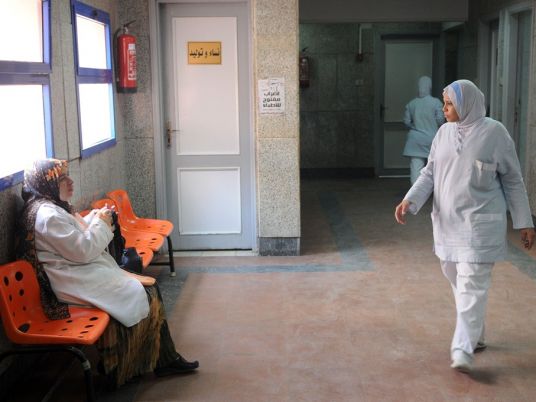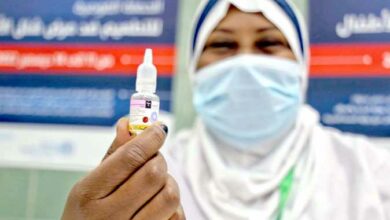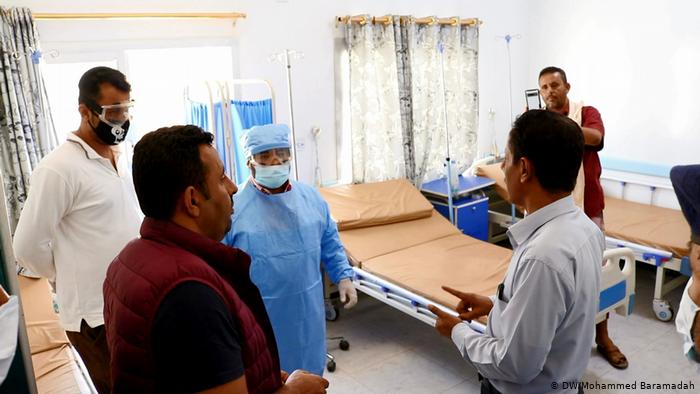
The doctors are on strike, but the patients haven’t noticed.
In Tanash primary care unit, in Warraq, north of Imbaba, doctors come into work to treat patients, but don’t demand the tickets, for which patients pay a LE1.5 charge.
The aim is to put pressure on the Health Ministry. But they gave up on talking about it inside the premises. In the ticket room near the entrance door, the patients, are told, “Go in without a ticket.”
“Is it certain?” they ask, then enter, unfazed. No one even utters the word “strike.”
Doctors have been on strike for more than six weeks, demanding improved conditions and a dramatic increase in the health budget. So far, the Health Ministry has refused to negotiate, and disputes within the Doctors Syndicate have weakened the strike.
Egypt spends about 5.6 percent of its budget on health, according to World Health Organization statistics. More than half of the nations surveyed by the WHO spend more than double that share, and 22 nations spend triple.
The lack of funding takes its toll on staff and patients.
“The patients tell us they cannot do anything to make the government put more money in it. They do not really understand our strike. But they know it’s not against them, it’s against the Health Ministry,” says one of the doctors, while examining one of the many children that came in last Tuesday for a free vaccination.
He writes the prescription on a scrap of paper.
“Normally, I prescribe the medication on the ticket, and they can get the drugs for free from our in-house pharmacy. But now they have to buy it from outside. It might cost them several dozen pounds,” he explains.
Sparrows fly in the waiting room, over the patients’ heads. The patients are mainly women with children or elderly people, standing or sitting on the floor. Only a few have a chair. A donkey brays outside.
“I feel guilty making them pay. They’re poor,” says the doctor.
His colleague says he tells patients with young children to go back and pay for a ticket; they then get their prescription for free.
The doctor discharges his patient to begin another consultation that lasts under five minutes, while waiting patients loll on the doorframe. Some people do not even make it in line. They show up in the reception, ask their question to whoever is in there — be it nurses or doctors having a break — and leave comforted as soon as they are told there is nothing to worry about.
In the reception room, there are shelves half full of blue files. They are supposed to have information about every family in the area.
After their consultation, the patients should come and say what they have so that the family files can be updated with the history of family diseases. But the files have been on the shelves for two years, and the care unit is still waiting for instructions to implement the process. They aren’t even sure which details to take down.
Other issues leave the staff perplexed. The walls and floors were covered in marble stone during the last refurbishment, which cost LE15 million, they say. But the pharmacy keeps running out of drugs and receives only the cheapest medication, the dentist keeps running out of anaesthetic, and there are not many machines.
The doctors remember some of their most frustrating moments: when they ran out of syringes, for example. Or, when a patient came in with a wound that needs stitches, but for which there was no suitably sized needle.
The patient’s relatives had to be sent to buy this basic equipment from their own pocket. In such cases, if the relatives cannot afford it, they have to go to another hospital.
“We can’t give the patients all the drugs they need to complete the treatment,” says the pharmacist. “We don’t have enough. So usually we give them pills to start the treatment, and they have to buy the rest from a private pharmacy.”
She says they receive a delivery of drugs every three months, but it is never enough. She also complains about the quality and variety of the drugs.
“We have the equivalent of what would be just one shelf of a private pharmacy,” she says.
“That’s what we’re asking with our strike,” one doctor says. “Where does the money go? Doctors and nurses don’t get the equipment they need. They’re never sent on training once they finish their studies.”
The head of the unit has his private clinic just across the street. He comes to the unit only in the afternoons, staff members say.
But the animating spirit of the clinic seems to be Hala. The 37-year-old energetic woman is affectionately nicknamed the “omda,” or village chief, by the unit staff. They say she does everything, working as a secretary, pharmacist and nurse.
Hala expertly dispatches the patients and is in charge of the tickets. Her voice is firm but friendly.
She says she has had a contract only for the last year and a half. Before that, for seven years, she worked without a contract. She has a high school education and lives just four minutes away from the unit, amid the shabby housing, dirt roads and banana trees.
Her husband did not want her to work.
But she adds, smiling, “Now my husband is OK with it. He knows it makes me happy. He changed his mind. I like working, I like the people here.”
“We’re like a family here, in the unit. And in the area, everybody knows us,” the pharmacist declares.
When the “omda’s” younger daughter finishes school, she comes in, chats with the nurses and hugs them.
“There are no Christian and Muslim issues in the unit,” she ascertains. The nurses sport pale pink veils and uniforms with well-worn cloth. One wears an immaculate white niqab.
The two young doctors happen to be Copts. Both are 25 and are still students. They are doing their first six-month training as general practitioners, while waiting for their specialty course to open.
All doctors of the unit are supposed to be in every day, but with the low pay — LE800 per month — and their studies, they cannot afford it. So they agreed to divide the days between them.
Officials from the district do, however, show up unexpectedly from time to time, and report who is not there. Hala says the doctors usually turn up at 9:30 or 10 am, especially the gynecologist or the dentist. But she is there at 8:30.
Between 8:30 am and 2 pm, the primary care unit receives most of its visitors.
There are usually 50 cases a day for the doctors, sometimes up to a hundred, and less for the dentist. Patients can also have some basic tests done for LE5, or ask for contraceptives for LE1 in the other rooms upstairs.
An accountant and a secretary who registers births in the afternoons both work in the care unit. The head of the care unit is the only one to operate the ultrasound, for pregnancy check-ups.
The care unit is a three-story building. On the second floor, dusty rooms never get used.
One of them is used as a conference room for the women of the area, perhaps twice a year. Another one is supposed to be a meeting room for the doctors and nurses.
The staff members never have time to use the kitchen next door, nor to use the restrooms or changing rooms, which are also covered in dust.
In the afternoon, treatments are more expensive than in the morning. A consultation at the family planning clinic, for example, costs LE3 after 2 pm, but just LE1 in the morning. After 2 pm, the crowd in the hall has disappeared.
But the young doctors say they often ignore the price rise and charge the lower fee. The end of their shift is usually when the head of the clinic arrives, in the middle of the afternoon, unless an emergency case comes up. Then, they stay until the emergency has been dealt with.
During the afternoon, an old man comes in slowly, leaning on his cane. His soft smile shows almost no teeth. He carries a bag of candies — in the area, they call this type of candy “arouah,” or spirits — and insists the young doctors take some.
He chats good-heartedly, about politics, weather and health, while they check his blood pressure. He comes in every afternoon, they say. He is almost always fine. An hour later, he is still inside the care unit, in the ticket room, chatting with the workers.
This piece appears in Egypt Independent’s weekly print edition.




